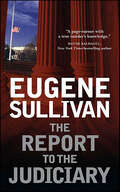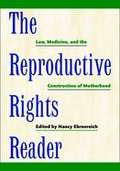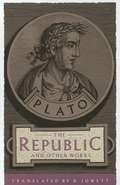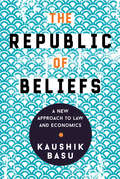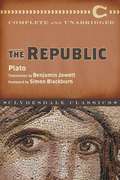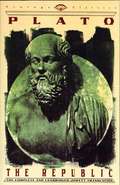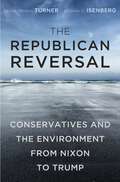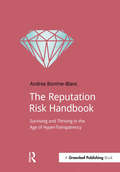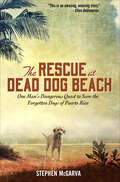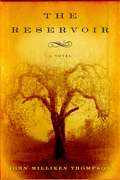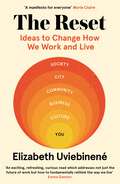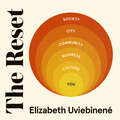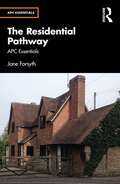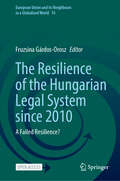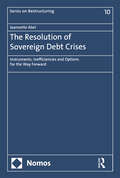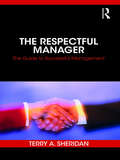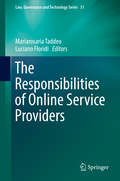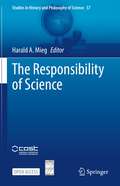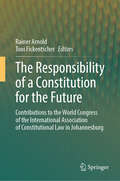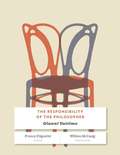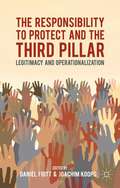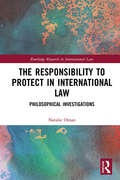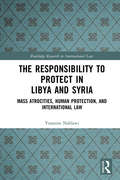- Table View
- List View
The Report to the Judiciary
by Eugene SullivanIn this tense novel of legal and political intrigue, Tim Quinn, the former judge previously seen in The Majority Rules, is assigned to investigate and compile a dossier on the newly appointed Chief Justice of the Supreme Court before his Senate confirmation hearing.The President has achieved lame duck status with a soon-to-be unfriendly Congress more bent on politics than policy. He realizes that the chance of establishing a legacy before his Presidency comes to an end is slim at best. So when the Chief Justice of the Supreme Court, a reasonably young and vigorous man, unexpectedly dies, the President happily appoints an interim successor to the position--the first black Chief Justice in US history.But one of the most conservative justices on the court feels that the position should have been his. He is hell bent on claiming it no matter who gets in the way…even if it means Quinn's report will bring dishonor to the highest court in the land.At the Publisher's request, this title is being sold without Digital Rights Management Software (DRM) applied.
The Reproductive Rights Reader: Law, Medicine, And The Construction Of Motherhood (Critical America #23)
by Nancy EhrenreichSince the passage of Roe v. Wade, the debate over reproductive rights has dominated America’s courts, legislatures, and streets. The contributors to The Reproductive Rights Reader embrace reproductive justice for all women, but challenge mainstream legal and political solutions based on protecting free choice via neutral governmental policies, which frequently ignore or jeopardize the interests of women of color and the poor. Instead, the pieces in this interdisciplinary book—including both legal cases and articles by legal scholars, historians, sociologists, political scientists and others—favor a critical analysis that addresses the concrete material conditions that limit choices, the role of law and social policy in creating those conditions, and the gendered power dynamics that inform and are reinforced by the regulation of human reproduction. The selections demonstrate that the right to choice isn’t an automatic guarantee of reproductive justice and gender equality; to truly achieve this ideal it is essential to recognize the complexity of women’s reproductive experiences and needs. Divided into four sections, the book examines feminist critiques of medical knowledge and practice; and the legal regulation of pregnancy termination, conception and child-bearing, and behavior during pregnancy.
The Republic and Other Works
by Plato Benjamin JowettA compilation of the essential works of Plato in one paperback volume: The Republic, The Symposium, Parmenides, Euthyphro, Apology, Crito, and Phaedo.
The Republic of Beliefs: A New Approach to Law and Economics
by Kaushik BasuA leading economist offers a radically new approach to the economic analysis of the lawIn The Republic of Beliefs, Kaushik Basu, one of the world's leading economists, argues that the traditional economic analysis of the law has significant flaws and has failed to answer certain critical questions satisfactorily. Why are good laws drafted but never implemented? When laws are unenforced, is it a failure of the law or the enforcers? And, most important, considering that laws are simply words on paper, why are they effective? Basu offers a provocative alternative to how the relationship between economics and real-world law enforcement should be understood.Basu summarizes standard, neoclassical law and economics before looking at the weaknesses underlying the discipline. Bringing modern game theory to bear, he develops a "focal point" approach, modeling not just the self-interested actions of the citizens who must follow laws but also the functionaries of the state—the politicians, judges, and bureaucrats—enforcing them. He demonstrates the connections between social norms and the law and shows how well-conceived ideas can change and benefit human behavior. For example, bribe givers and takers will collude when they are treated equally under the law. And in food support programs, vouchers should be given directly to the poor to prevent shop owners from selling subsidized rations on the open market. Basu provides a new paradigm for the ways that law and economics interact—a framework applicable to both less-developed countries and the developed world.Highlighting the limits and capacities of law and economics, The Republic of Beliefs proposes a fresh way of thinking that will enable more effective laws and a fairer society.
The Republic: Book Vii (Books That Changed The World Ser. #4)
by Plato Simon BlackburnPackaged in handsome, affordable trade editions, Clydesdale Classics is a new series of essential works. From the musings of intellectuals such as Thomas Paine in Common Sense to the striking personal narrative of Harriet Jacobs in Incidents in the Life of a Slave Girl, this new series is a comprehensive collection of our intellectual history through the words of the exceptional few.Originating in approximately 380 BC, Republic is a Socratic dialogue written by famed Greek philosopher Plato. Often referred to as Plato’s masterwork, Republic’s central goal is to define the ideal state. By conceptualizing this model state, Greeks believed it would lead states formed with its principles in mind to function the most efficiently and fairly, striving toward justice and the greater good of society.This edition includes a foreword by British American philosopher and Plato expert Simon Blackburn. Widely read around the world by philosophy students and academics alike, Plato’s Republic is sure to pass on its invaluable lessons and enlighten the next generation of thinkers.
The Republic: The Complete and Unabridged Jowett Translation (Vintage Classics)
by Plato(Book Jacket Status: Jacketed)Toward the end of the astonishing period of Athenian creativity that furnished Western civilization with the greater part of its intellectual, artistic, and political wealth, Plato wrote The Republic, his discussion of the nature and meaning of justice and of the ideal state and its ruler. All subsequent European thinking about these subjects owes its character, directly or indirectly, to this most famous (and most accessible) of the Platonic dialogues. Although he describes a society that looks to some like the ideal human community and to others like a totalitarian nightmare, in the course of his description Plato raises enduringly relevant questions about politics, art, education, and the general conduct of life.Translated by A. D. Lindsay
The Republican Reversal: Conservatives and the Environment from Nixon to Trump
by James Morton TurnerNot long ago Republicans took pride in their tradition of environmental leadership. The GOP helped create the EPA, extend the Clean Air Act, and protect endangered species. Today Republicans denounce climate change as a “hoax” and seek to dismantle environmental regulations. What happened? James Morton Turner and Andrew C. Isenberg provide answers.
The Reputation Risk Handbook: Surviving and Thriving in the Age of Hyper-Transparency
by Andrea Bonime-BlancThis book will show you how to build a sustainable reputation risk management framework and how to handle your next reputation risk crisis. It will help you identify ways in which reputation risk can impact bottom line, and then show you how to set up a framework for turning that risk into an opportunity for good, sustainable business. Reputation risk is a strategic risk and a potentially material risk, all the more so in the "age of hyper-transparency". This needs to be clearly understood by both management and boards of directors so that the people tasked with reputation risk have the support they need to align their reputation risk management with business strategy and planning. The Reputation Risk Handbook provides a clear framework to identify, manage and resolve reputation risk, including: a clear description of what reputation risk is and how it fits within the pantheon of corporate and institutional risk and strategic management; a practical process for creating early warning systems and on-going management and monitoring of reputation risks; techniques for aligning reputation risk management with business strategy and business planning; several case studies, including examples of when reputation risk management has gone wrong; examples of how to manage specific reputation risks successfully or deal with a reputation risk crisis. The Reputation Risk Handbook is not just for practitioners – those who manage risk and reputation directly – but for those who have oversight of risk management – namely boards, their committees and the c-suite. In addition to a framework for practitioners, the book provides specific suggestions for boards, including questions to ask management and what to look for within their organizations.
The Rescue at Dead Dog Beach: One Man's Dangerous Quest to Save the Forgotten Dogs of Puerto Rico
by Stephen McGarvaThe “heartbreaking . . . deeply-moving” story of the heroic crusade to save Puerto Rico’s stray dogs, and an impassioned appeal to help all animals in need (Daily Mail).Looking for inspiration and adventure in their lives, Steve McGarva and his wife Pam moved to Puerto Rico. While kite surfing at Playa Lucia, Steve made a shocking discovery—a sick and abandoned dog—that would transform his life. With its shimmering white sand, palm trees, and dazzling azure water, the beach looked postcard perfect. But its beauty hid a dark side: To the locals, this slice of paradise was known as Dead Dog Beach—a notorious dumping ground for the island’s unwanted canines.Considered a threat to the area’s lucrative tourism industry, these defenseless animals were in constant danger of brutality and death. Enraged, and refusing to accept such cruelty, McGarva began protecting these helpless animals—actions that would jeopardize his marriage, challenge his sanity, and make him a target of locals determined to stop him.The Rescue at Dead Dog Beach is the story of Steve’s fearless dedication to hundreds of dogs, and his efforts to expose their systemic abuse. Exposing the true costs of the tourist industry, it is also a call to arms for animal lovers, offering insights and practical information to help strays anywhere in the world.“Stephen McGarva moved to Puerto Rico in search of sun and fun. What he found was a new purpose: saving the island’s abandoned dogs.” —People“This is an amazing story.” —Ellen DeGeneres
The Reservoir: A Novel
by John Milliken ThompsonOn an early spring morning in Richmond, Virginia, in the year 1885, a young pregnant woman is found floating in the city reservoir. It appears that she has committed suicide, but there are curious clues at the scene that suggest foul play. The case attracts local attention, and an eccentric group of men collaborate to solve the crime. Detective Jack Wren lurks in the shadows, weaseling his way into the investigation and intimidating witnesses. Policeman Daniel Cincinnatus Richardson, on the brink of retirement, catches the case and relentlessly pursues it to its sorrowful conclusion. As the identity of the girl, Lillie, is revealed, her dark family history comes to light, and the investigation focuses on her tumultuous affair with Tommie Cluverius. Tommie, an ambitious young lawyer, is the pride and joy of his family and the polar opposite of his brother Willie, a quiet, humble farmer. Though both men loved Lillie, it's Tommie's reckless affair that thrusts his family into the spotlight. With Lillie dead, Willie must decide how far to trust Tommie, and whether he ever understood him at all. Told through accumulating revelations, Tommie's story finally ends in a riveting courtroomclimax. Based on a true story, The Reservoir centers on a guilty and passionate love triangle composed of two very different brothers and one young, naive girl hiding an unspeakable secret. A novel of lust, betrayal, justice, and revenge, The Reservoir ultimately probes the question of whether we can really know the hearts and minds of others, even of those closest to us.
The Reset: Ideas to Change How We Work and Live
by Elizabeth Uviebinené Elizabeth UviebinenéSome people seek purpose in work. Others see work as a tool to live with purpose outside of work. Where do you sit on this scale?'An exciting, refreshing, curious read which addresses not just the future of work but how to fundamentally rethink the way we live' -EMMA GANNON, author of The Sunday Times bestseller The Multi-Hyphen Method"At a time when many of us are reconsidering our work/life balance in the long-term, it's an illuminating read." - Cosmopolitan"The Reset is a provocative guide to how we fit into an ecosystem' - The Financial Times"This book made me stop and rethink my relationship with work. Elizabeth challenges us all to create a new social contract with trust, purpose and community at its heart. Where we work by design and not by default and in doing so, create a world of work that is more balanced, inclusive and better for everyone." - Helen Tupper, CEO of Amazing If and co-author of The Squiggly Careers________________Being busy isn't an IdentityPerks aren't office CultureProfit isn't all we want from BusinessLoneliness shouldn't happen in a CommunityInequality isn't inevitable in a CityWe can all shape SocietyFrom the award-winning author and Financial Times columnist Elizabeth Uviebinené, a fundamental rethink of how we work and live. Because if we're going to really benefit from the radical shift of 2020, we have to rethink how we fit into an ecosystem. Elizabeth started with a simple desire to explore our relationship with work, and how it was impacting our lives. It became clear if we want to reset how we work as individuals, we're going to need to reset the work culture we exist in, the businesses we work for, the communities we're a part of, the cities we live in and the society we can shape. We can't just rethink one strand of society; we need to rethink everything together. It's time for a Reset. The Reset is a short, digestible book for people who want to work better, and live better. Elizabeth addresses our urge to work differently, to work in a way that suits more parts of our lives. It's optimistic, positive and provocative, offering fresh perspectives on the way we live now, and a punchy idea for how we might live in the future. So what's possible now that would have seemed impossible before? The Reset features interviews from:Sadiq Khan, Mayor of LondonAlex Mahon, CEO of Channel 4Ete Davies, CEO of Engine GroupRachel Botsman, Oxford University's first Trust fellowSereena Abassi, Worldwide Head of Culture and Inclusion, M&C SaatchiAnna Whitehouse (Mother Pukka), flexible working campaignerCassandra Stavrou, Founder of ProperIndy Johar, Founder of think tank Dark Matter LabsNadia Whittome, Labour MP for NottinghamPip Jameson, Founder of the DotsKaren Rosenkranz, trend forecaster and consultantJoanna Lyall, UK CEO of Brainlabs
The Reset: Ideas to Change How We Work and Live
by Elizabeth UviebinenéSome people seek purpose in work. Others see work as a tool to live with purpose outside of work. Where do you sit on this scale?'An exciting, refreshing, curious read which addresses not just the future of work but how to fundamentally rethink the way we live' -EMMA GANNON, author of The Sunday Times bestseller The Multi-Hyphen Method"At a time when many of us are reconsidering our work/life balance in the long-term, it's an illuminating read." - Cosmopolitan"The Reset is a provocative guide to how we fit into an ecosystem' - The Financial Times"Uviebinené's passion about resetting how we live and work is infectious and eye-opening." - Marie Claire"This book made me stop and rethink my relationship with work. Elizabeth challenges us all to create a new social contract with trust, purpose and community at its heart. Where we work by design and not by default and in doing so, create a world of work that is more balanced, inclusive and better for everyone." - Helen Tupper, CEO of Amazing If and co-author of The Squiggly Careers________________Being busy isn't an IdentityPerks aren't office CultureProfit isn't all we want from BusinessLoneliness shouldn't happen in a CommunityInequality isn't inevitable in a CityWe can all shape Society From the award-winning author and Financial Times columnist Elizabeth Uviebinené, a fundamental rethink of how we work and live. Because if we're going to really benefit from the radical shift of 2020, we have to rethink how we fit into an ecosystem. Elizabeth started with a simple desire to explore our relationship with work, and how it was impacting our lives. It became clear if we want to reset how we work as individuals, we're going to need to reset the work culture we exist in, the businesses we work for, the communities we're a part of, the cities we live in and the society we can shape. We can't just rethink one strand of society; we need to rethink everything together. It's time for a Reset. The Reset is a short, digestible book for people who want to work better, and live better. Elizabeth addresses our urge to work differently, to work in a way that suits more parts of our lives. It's optimistic, positive and provocative, offering fresh perspectives on the way we live now, and a punchy idea for how we might live in the future. So what's possible now that would have seemed impossible before? The Reset features interviews from:Sadiq Khan, Mayor of LondonAlex Mahon, CEO of Channel 4Ete Davies, CEO of Engine GroupRachel Botsman, Oxford University's first Trust fellowSereena Abassi, Worldwide Head of Culture and Inclusion, M&C SaatchiAnna Whitehouse (Mother Pukka), flexible working campaignerCassandra Stavrou, Founder of ProperIndy Johar, Founder of think tank Dark Matter LabsNadia Whittome, Labour MP for NottinghamPip Jameson, Founder of the DotsKaren Rosenkranz, trend forecaster and consultantJoanna Lyall, UK CEO of Brainlabs
The Reset: Ideas to Change How We Work and Live
by Elizabeth UviebinenéBeing busy isn't an IdentityPerks aren't office CultureProfit isn't all we want from BusinessLoneliness shouldn't happen in a CommunityInequality isn't inevitable in a CityWe can all shape Society From the award-winning author and Financial Times columnist Elizabeth Uviebinené, a fundamental rethink of how we work and live. Because if we're going to really benefit from the radical shift of 2020, we have to rethink how we fit into an ecosystem. Elizabeth started with a simple desire to explore our relationship with work, and how it was impacting our lives. It became clear if we want to reset how we work as individuals, we're going to need to reset the work culture we exist in, the businesses we work for, the communities we're a part of, the cities we live in and the society we can shape. We can't just rethink one strand of society; we need to rethink everything together. It's time for a Reset. The Reset is a short, digestible book for people who want to work better, and live better. Elizabeth addresses our urge to work differently, to work in a way that suits more parts of our lives. It's optimistic, positive and provocative, offering fresh perspectives on the way we live now, and a punchy idea for how we might live in the future. So what's possible now that would have seemed impossible before? The Reset features interviews from:Sadiq Khan, Mayor of LondonAlex Mahon, CEO of Channel 4Ete Davies, CEO of Engine GroupRachel Botsman, Oxford University's first Trust fellowSereena Abassi, Worldwide Head of Culture and Inclusion, M&C SaatchiAnna Whitehouse (Mother Pukka), flexible working campaignerCassandra Stavrou, Founder of ProperIndy Johar, Founder of think tank Dark Matter LabsNadia Whittome, Labour MP for NottinghamPip Jameson, Founder of the DotsKaren Rosenkranz, trend forecaster and consultantJoanna Lyall, UK CEO of Brainlabs(P)2021 Hodder & Stoughton Limited
The Residential Pathway: APC Essentials (APC Essentials)
by Jane ForsythThe Residential Pathway - APC Essentials was written to facilitate and encourage candidates preparing for the RICS Assessment of Professional Competence (APC) to become Chartered Surveyors. This book will help candidates, their Counsellors and supervisors to understand: The requirements of the Residential pathway The detail of the technical competencies How to select suitable competencies How to demonstrate the required knowledge and experience; and How to succeed in the final interview. It will also be a useful reference for AssocRICS candidates and qualified professionals.This concise book has clear headings to guide readers, with bullet-point checklists and signposting to key themes and important sources for further reading. It alerts readers to the need to be aware of changes and developments in the residential sector, and to the wider economic, social, and political factors that influence it. This book includes lists of relevant RICS (and other) professional publications, the laws and regulations that frame professional surveying practice, and example written submissions for the technical competencies at each level. It will help to motivate and reassure candidates, giving them confidence to recognise the value and relevance of their knowledge and practical experience, and to understand how to best apply this to demonstrate their professional competence.
The Resilience of the Hungarian Legal System since 2010: A Failed Resilience? (European Union and its Neighbours in a Globalized World #16)
by Fruzsina Gárdos-OroszThis open access book explains the factors that cause the poor functioning or failure of certain legal institutions or the success of others in the current Hungarian legal system after the 2010 transition from liberal to illiberal/populist democracy. The authors argue in most regulatory areas that reform is needed in lawmaking or in the application and practice of law, because there are systemic problems with the law’s capacity for doctrinal resilience, which lead to the primacy of other regulators than law, such as the populist politics. An understanding of these processes is essential for the implementation of sound law and legal policy reforms, for the maintenance of the legal guarantee system and for the successful development of institutions protecting and providing the fundamental rights. The volume documents how the Hungarian legal system changed after 2010, on the one hand, and conceptualises these changes with the help of ‘resilience’, on the other hand.
The Resolution of Sovereign Debt Crises: Instruments, Inefficiencies and Options for the Way Forward
by Jeannette AbelThe insolvency of states is by no means a rare or new phenomenon. Despite this, it still seems to be widely felt that states do not go bankrupt. As of yet, there are no regulated insolvency proceedings for states. This book examines the current mechanisms for solving sovereign debt crises. It presents an analysis of their weaknesses and shows possibilities for dealing with such crises in the future. In this respect, the work focusses on crisis resolution measures at European level: the aid packages for Greece, the European Financial Stabilisation Mechanism, the European Financial Stabilisation Facility and the European Stability Mechanism. These are examined for their appropriateness as well as whether they contain elements of insolvency law. Ultimately, it explores possible insolvency proceedings for states at EU level and their implementation options.
The Respectful Manager: The Guide to Successful Management
by Terry A. SheridanMany people are confused by mixed messages from their managers. About 85% of the pool of managers are malevolent, who do not care about the organisation and use the structure for their own needs of power and control. We know what a good manager looks like, but in complex social interactions within organisations this can be confused with the manipulations of the malevolent managers, from CEO to the lowest grade supervisor. The Respectful Manager: The Guide to Successful Management is about the application of the Executive Impression Management type of the Respectful Manager, derived from new ground-breaking research regarding fraudster managers. It explains clearly and precisely what a good manager looks like and behaves like with their co-workers. In this book, the foundations are laid to understand and recognise a Respectful Manager. This is critical for management training purposes and for managerial recruitment and promotion procedures. For those looking at increasing profitability, increasing competitive edge, and engaging their workforce in fulfilling work, the Respectful Manager is the key. This book is a must read for those who aspire to management roles, including senior management, as a guide to the very best practice in the field.
The Responsibilities of Online Service Providers
by Luciano Floridi Mariarosaria TaddeoThis volume focuses on the responsibilities of online service providers (OSPs) in contemporary societies. It examines the complexity and global dimensions of the rapidly evolving and serious challenges posed by the exponential development of Internet services and resources. It looks at the major actors - such as Facebook, Google, Twitter, and Yahoo! - and their significant influence on the informational environment and users' interactions within it, as well as the responsibilities and liabilities such influence entails. It discusses the position of OSPs as information gatekeepers and how they have gone from offering connecting and information-sharing services to paying members to providing open, free infrastructure and applications that facilitate digital expression and the communication of information. The book seeks consensus on the principles that should shape OSPs' responsibilities and practices, taking into account business ethics and policies. Finally, it discusses the rights of users and international regulations that are in place or currently lacking.
The Responsibility of Science (Studies in History and Philosophy of Science #57)
by Harald A. MiegThis open access book provides an overview of issues of scientific responsibility. The volume comprises three types of contributions: first, analyses of the responsibility of science; second, analyses of the structural conditions for science and its responsibility; and third, normative versions of scientific responsibility. The questions and problems dealt with include science as a profession, ambivalence of research and dual-use, innovation vs. precaution, notions of responsibility, the role of science within society and its relation to human rights, as well as scientific and public discourses. The book addresses scholars in the fields of Science Studies and Research Policy.This is an open access book.
The Responsibility of a Constitution for the Future: Contributions to the World Congress of the International Association of Constitutional Law in Johannesburg
by Rainer Arnold Toni FickentscherA constitution has the task of realizing its regulatory objective for the entire duration of its existence. In doing so, it bears responsibility for the present, but also for the future. It must ensure that the legitimate interests of future generations are also taken into account in today’s decision-making and policies. The concept of intertemporal protection of fundamental rights developed by German constitutional jurisprudence and the jurisprudence in other countries have particularly stimulated the discussion on the constitution's responsibility for the future, which is important in numerous areas. At the World Congress of the International Association of Constitutional Law in Johannesburg in December 2022, one workshop, which was chaired by the two editors of this volume, was dedicated to this topic. This book brings together the presentations of 13 authors from 10 countries on fundamental questions and specific aspects of this important issue.
The Responsibility of the Philosopher
by Gianni VattimoOver the course of his career, Gianni Vattimo has assumed a number of public and private identities and has pursued multiple intellectual paths. He seems to embody several contradictions, at once defending and questioning religion and critiquing and serving the state. Yet the diversity of his life and thought form the very essence of, as he sees it, the vocation and responsibility of the philosopher. In a world that desires quantifiable results and ideological expediency, the philosopher becomes the vital interpreter of the endlessly complex.As he outlines his ideas about the philosopher's role, Vattimo builds an important companion to his life's work. He confronts questions of science, religion, logic, literature, and truth, and passionately defends the power of hermeneutics to engage with life's conundrums. Vattimo conjures a clear vision of philosophy as something separate from the sciences and the humanities but also intimately connected to their processes, and he explicates a conception of truth that emphasizes fidelity and participation through dialogue.
The Responsibility to Protect and the Third Pillar
by Daniel Fiott Joachim KoopsAs the RtoP moves from norm to operationalization, greater analysis of action to halt crimes against humanity, war crimes, genocide and ethnic cleansing is needed. This uncovers opportunities and challenges associated with third pillar interventions by looking at legal, economic, political, military and alternative interventions in third-countries.
The Responsibility to Protect in International Law: An Emerging Paradigm Shift (Routledge Research in International Law)
by Susan BreauThis book will consider a rapidly emerging guiding general principle in international relations and, arguably, in international law: the Responsibility to Protect. This principle is a solution proposed to a key preoccupation in both international relations and international law scholarship: how the international community is to respond to mass atrocities within sovereign States. There are three facets to this responsibility; the responsibility to prevent; the responsibility to react, and the responsibility to rebuild. This doctrine will be analysed in light of the parallel development of customary and treaty international legal obligations imposing responsibilities on sovereign states to the international community in key international law fields such as international human rights law, international criminal law and international environmental law. These new developments demand academic study and this book fills this lacuna by rigorously considering all of these developments as part of a trend towards assumption of international responsibility. This must include the responsibility on the part of all states to respond to threats of genocide, crimes against humanity, ethnic cleansings and large-scale war crimes. The discussion surrounding aggravated state responsibility is also explored, with the author concluding that this emerging norm within international law is closely related to the responsibility to protect in its imposition of an international responsibility to act in response to an international wrong. This book will be of great interest to scholars on international law, the law of armed conflict, security studies and IR in general.
The Responsibility to Protect in International Law: Philosophical Investigations (Routledge Research in International Law)
by Natalie OmanThis book tracks the development of the emerging international legal principle of a responsibility to protect over the past two decades. It contrasts the influential version of the principle introduced by the International Commission on Intervention and State Sovereignty in 2001 with subsequent interpretations of the responsibility to protect advocated by the United Nations through its human protection agenda, and reviews the dangers and inconsistencies inherent in both perspectives. The author demonstrates that the evolving responsibility to protect principle can be recruited to support a wide range of irreconcilable projects, from those of cosmopolitan constitutionalism to those of hegemonic international law. However, despite the dangers posed by this susceptibility to conceptual hijacking, Oman argues that the responsibility to protect, like human rights, is an essential a modern emancipatory formation. To remedy this dangerous malleability, the author advocates a third, distinctive interpretation of the responsibility to protect designed to limit its cooptation by liberal anti-pluralist and hegemonic international law agendas. Oman outlines the key features of such a minimalist conception, and explores its fit with the "RtoP" version of the responsibility to protect promoted in recent years by the UN. The author argues that two crucial features missing from the UN reading of the principle should be developed in future: an acknowledgement of the role of non-state actors as bearers of the responsibility to protect, and a recognition of the principle's legal character. Both of these aspects of the principle offer means to democratize the international law-making enterprise.
The Responsibility to Protect in Libya and Syria: Mass Atrocities, Human Protection, and International Law (Routledge Research in International Law)
by Yasmine NahlawiThis book offers a novel and contemporary examination of the ‘responsibility to protect’ (R2P) doctrine from an international legal perspective and analyses how the doctrine was applied within the Libyan and Syrian conflicts as two recent and highly significant R2P cases. The book dissects each of R2P’s three component pillars to examine their international legal underpinnings, drawing upon diverse legal frameworks – including the laws of the UN, laws of international organisations, human rights law, humanitarian law, criminal law, environmental law, and laws of State responsibility – to extract conclusions regarding existing and emerging host and third-State obligations to prevent and react to mass atrocity crimes. It uses this legal grounding to critically examine specific aspects of the Libyan and Syrian R2P cases, engaging with some of the more traditional debates surrounding R2P’s application, most notably those that pertain to the use of force (or lack thereof), but also exploring some of the less-researched non-military methods that were or could have been employed by States and international organisations to uphold the doctrine. Such an analysis captures the diversity in the means and actors through which R2P can be implemented and allows for the extraction of more nuanced conclusions regarding the doctrine’s strengths and limitations, gaps in enforceability, levels of State support, and future trajectory. The book will be of interest to scholars and students in the field of international law and human rights law.
